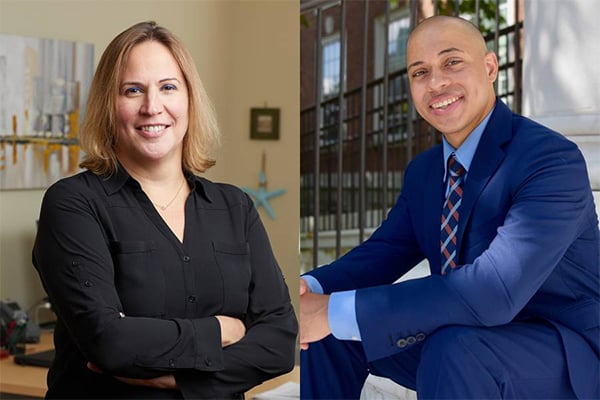The Howard Hughes Medical Institute has awarded three pairs of Johns Hopkins PhD students and their mentors a 2020 Gilliam Fellowship for Advanced Study, which not only recognizes students who have the potential to be leaders in their fields, but also is designed to advance diversity and inclusion in the sciences.
Franklyn Hall, a rising fourth-year doctoral candidate in biomedical engineering and in the Institute for NanoBioTechnology, and his advisor, INBT Director Sharon Gerecht, were among 45 recipients of the award, which provides each student-mentor pair $50,000 annually for three years. The award will allow Gerecht to create professional development activities and training for students from background that are traditionally underrepresented in the science and in higher education and for their faculty mentors.
“We are grateful not only for the career-enhancing opportunities that the fellowship offers Franklyn, but also for helping us advance our longstanding goal to increase the diversity of our trainees, who are the next generation of science and engineering leaders,” said Gerecht, a professor in the Department of Chemical and Biomolecular Engineering.
Hall is working to create in vitro models for patients with Marfan syndrome, a genetic disorder that affects the body’s connective tissue. The disorder can have many complications, including cardiovascular problems and, specifically, problems with the body’s main artery, the aorta. The tissue can tear, leading to a full rupture, and patients may need surgery to repair the damaged tissue. Hall hopes to use his models to study the disease on a patient-specific level, using their own stem cells. Since in vitro models focus on cell behavior, they can help physicians anticipate how the disorder will progress over time and how each patient will respond to treatments.
“The fellowship allows me to overcome the limitations of the materials and techniques used in the lab today to pursue challenging scientific questions as I work to complete my thesis,” said Hall. “Additionally, I look forward to the scientific development opportunities that the fellowship supports outside of my home lab with a new network of Gilliam’s peers.”
While the details of the diversity activities are still under development, they tentatively include a retreat for incoming graduate students who come from underrepresented backgrounds, as well as professional development workshops and opportunities for interested students to connect with industry professionals. However, according to Gerecht, diversity-enhancing activities will not be limited to students. She also envisions organizing and holding interactive workshops designed to help faculty members better understand the needs and challenges faced by underrepresented students and how to help them succeed.
Such programs will be developed in consultation with Darlene Saporu, assistant dean for diversity and inclusion for the Whiting School of Engineering and the Krieger School of Arts and Sciences, and with collaborators from other Hopkins organizations, such as the Black Graduate Student Association, Society of Black Alumni, and Krieger and Whiting Diversity Champions.
Hall and Gerecht met in the summer of 2015 when he performed research in Gerecht’s lab as an undergraduate student at Mississippi State University. Hall participated in the Johns Hopkins Research Experience for Undergraduates program, which provides undergraduate students research training outside of their home institution. Hall enjoyed the experience so much that he returned in the summer of 2016 through the same program and eventually decided to get his PhD at Johns Hopkins University under Gerecht’s guidance.
After he completes his PhD, Hall is interested in focusing on pharmacogenetics, which is the study of how changes in genes, even a single one, can affect a drug’s efficacy. Specifically, Hall wants to know how different ethnic populations respond to medications to aid in better drug development and disease treatments.
Other winners from Johns Hopkins are Michael Hopkins and his adviser Seth Margolis and Miguel Pacheco and his adviser Rachel Green.
– Gina Wadas

